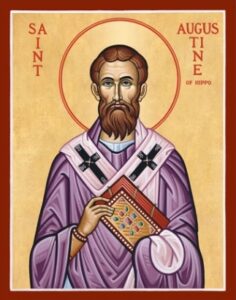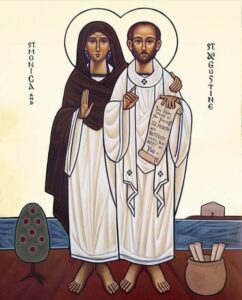St Augustine – Aug 28

Augustine of Hippo was one of the great Church Fathers of the fourth century, a renowned theologian and prolific writer, and a skilled preacher and rhetorician. St. Augustine is respected in the Orthodox Church only as a teacher, because of his wonderful defense of the Church’s teachings against the various heresies of his time, but because of his errors in his teachings about predestination in the salvation of man, he was never considered a saint and quotes it clearly states that Augustine of Hippo is a ‘bishop, and theologian’. He is one of the Latin Fathers of the Church and Roman Catholics, formally recognize him as a doctor of the Church. He is recognized as a saint and a Doctor of the Church, by the Roman Catholic and Eastern Orthodox Churches for his contribution to theology.
Aurelius Augustinus was born in 354, in the city of Thagaste in northern Africa (now in Algeria) as the eldest son of a Christian mother Monica and a pagan father Patricius, who later adopted Christianity. Patricius had a violent temper and appears to have been of dissolute habits. Augustine was raised by his mother, in Roman north Africa. His mother’s fervent faith was a strong influence on young Augustine, one that would follow him throughout his life. She gave alms regularly, did good deeds and had prayer habits. She was well-known as an alms giver, and when she began preaching the Christian message in charity, instead of simply giving food or money to supplicants, she showed Augustine by her example the importance of a pure heart.

Though Augustine from the beginning was a brilliant student, when he received his education at Carthage and showed early talents as a scholar, with an eager intellectual curiosity, but he lived a life of sin and wandered from the faith at a young age. His mother was horrified, disheartened and disappointed and tried her best to turn him away. She did not give up. She followed Augustine to Milan. He followed the Manichaean religion in his student days. He was employed as a professor of rhetoric in Milan by 383 where St. Ambrose was bishop. Under the guidance of Saint Ambrose, Augustine studied the Holy Scriptures. The Word of God produced in his soul a radical crisis.
Augustine taught grammar at Thagaste during 373 and 374. The following year he moved to Carthage to conduct a school of rhetoric and remained there for the next nine years. Finally, he was converted to Christianity listening to the preaching’s and examples of St. Ambrose of Milan. Augustine re-evaluated himself and was forever changed. Her tearful prayers were heard by God. He accepted holy Baptism, in 387. He gave all his wealth to the poor and was tonsured as a monk.
He returned to north Africa and created a monastic foundation at Tagaste for himself and a group of friends. In the year 391 Valerian, Bishop of Hippo Regius (now Annaba, in Algeria), ordained Saint Augustine a priest, and in 395, appointed him vicar bishop of the see of Hippo. After the death of Bishop Valerian, Saint Augustine took his place.
In 395, he was made Bishop of Hippo, and remained in that position until his death in 430. He wrote his autobiographical Confessions in 397–398. During his 35 years as bishop, Saint Augustine wrote many works devoted to combating the Donatist, Manichaean and Pelagian heresies. He became a famous preacher (more than 350 preserved sermons are believed to be authentic), and was noted for combatting the Manichaean heresy. He left his monastery, but continued to lead a monastic life in the episcopal residence. He left a Rule (Regula in Latin) for his monastery that has led him to be designated the “patron saint of Regular Clergy,” that is, parish clergy who live by a monastic rule.
Saint Augustine wrote many works (according to his student and biographer Possidias, the number approached 1030). Of his works the best known are: The City of God (De civitate Dei), The Confessions, 17 Books against the Pelagians and Handbook of Christian Knowledge (The Enchiridion). Saint Augustine was concerned above all else that his writings be intelligent and edifying. “It is better,” he said, “for them to condemn our grammar, than for people not to understand.” St. Augustine evidently originated the phrase “love the sinner, hate the sin“, which he tied in with a privative notion of evil. His motto was ‘One heart and soul in God’. He is also known as the ‘Son of tears’ because of the endless tears his mother shed until his conversion. Augustine worked tirelessly in trying to convince the people of Hippo to convert to Christianity. Though he had left his monastery, he continued to lead a monastic life until his death on August 28, 430.
May the endless tears and efforts of St Monica be a comfort to us all and may the blessings and prayers of St Augustine be with us.
He is known for his Quotes.
Faith is to believe what you do not see; the reward of this faith is to see what you believe.
Pray as though everything depended on God. Work as though everything depended on you.
Since love grows within you, so beauty grows. For love is the beauty of the soul.
God loves each of us as if there were only one of us.
He who created us without our help will not save us without our consent.
If you believe what you like in the gospels, and reject what you don’t like, it is not the gospel you believe, but yourself.
O Holy Spirit, descend plentifully into my heart. Enlighten the dark corners of this neglected dwelling and scatter there Thy cheerful beams.

0 Comments